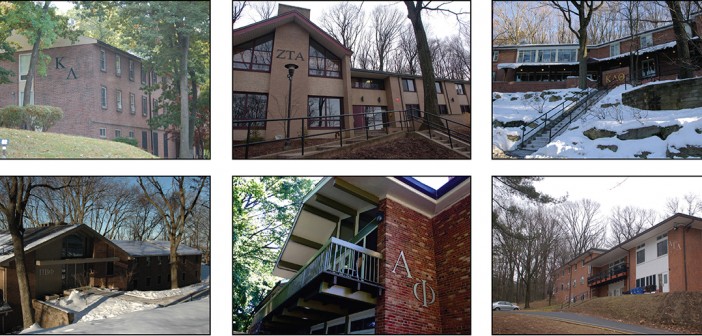A myth has been circulating around Lehigh’s campus for years. This myth’s origin is unknown, and it suggested that any facility housing more than six women is considered a brothel in the Commonwealth of Pennsylvania.
It has also been said that sorority houses, which are often home to more than 40 women at a time, skirt this law by paying for laundry in their Greek houses.
In a Panhellenic Council meeting on March 3, more than half of the Panhel representatives who live in Greek houses where they have to pay for laundry said they had believed in this law. Six of the nine sororities on campus pay for laundry. Gamma Phi Beta, Alpha Omicron Pi and Alpha Chi Omega do not pay for laundry in their houses.
Jim Schantz, a legislative assistant to Pennsylvania Senator Lisa Boscola, debunked the myth.
“We have found no such law in the Commonwealth of Pennsylvania,” Schantz said. “I even checked with the city’s zoning office, and a sorority is a permitted use in the institutional zone within the city of Bethlehem.”
So if this law doesn’t exist, why do most sororities have to pay for laundry in their houses?
Each house on the Hill decides if the members will pay for laundry or not, according to Katy Kresge, the associate director of Residential Services. Each house on the Hill decides if they will use Lehigh’s machines or purchase their own.
“It’s decided by the Greek chapters whether or not they want to take part in Lehigh’s laundry service or if they want to purchase their own machines,” Kresge said.
If houses want to purchase their own machines, women who live in the houses will not have to pay Lehigh for the use of its washers and dryers.
Laundry contracts are made available to Greek houses every three years. The last contracts were signed in the 2014. In 2017, each chapter will decide if it wants to join Lehigh’s plan and use the washers provided by the school. If the houses decide to do this, residents will have to pay for laundry.
Currently six sororities and three fraternities have laundry contracts with Residential Services to use their machines, Kresge said. She said she is not sure why more sororities are on the plan than fraternities.
“It’s kind of six of one, half dozen of the other,” she said. “If you have your own machine, you don’t have to put coins in there or GoldPlus or anything like that, but you have to handle maintenance and all those types of things if it breaks.”
This rumor of a brothel law has also spread to other schools in Pennsylvania. At Penn State, each sorority lives on its own floor in a residence hall instead of living in houses. This prompted the start of the same myth on its campus, but the Penn State Panhellenic Council said the current system is designed to keep chapter dues low and affordable for everyone, according to its website.
No one knows for certain how the myth came to Lehigh’s campus.
“My roommate told me about it freshman year, and I believed it,” Anna Malisova, ’18, said. “I didn’t really question it, but I was angered by it because I thought it was sexist.”
Tristan Heffler, ’18, was offended by the myth and said she wondered why the law was gendered. When touring off-campus houses for senior year, landlords repeatedly told Heffler that more than five women could not live in a house together.
“I would always hear different numbers, sometimes five and sometimes six,” she said. “I always just figured that this law existed but people were confused about the number of women allowed to live in a house.”
The landlords who spoke with Heffler most likely were referring to a law in the city of Bethlehem that prohibits more than five unrelated persons from living together.
Article 1739 lists the ordinances of the city of Bethlehem in regards to regulated rental unit occupancy. Section 3.2 dictates, “The maximum number of persons permitted to reside in any regulated rental unit at any time shall not exceed five occupants.”
This ordinance, however, was created in response to occupancy issues and does not discriminate based on gender.
Heffler, although happy that the brothel law does not exist, is discouraged by the pervasiveness of the rumor on Lehigh’s campus.
“The fact that this rumor started in the first place, and that people actually believed it, says a lot about how women are viewed,” Heffler said. “It’s upsetting.”






Comment policy
Comments posted to The Brown and White website are reviewed by a moderator before being approved. Incendiary speech or harassing language, including comments targeted at individuals, may be deemed unacceptable and not published. Spam and other soliciting will also be declined.
The Brown and White also reserves the right to not publish entirely anonymous comments.
1 Comment
Well, it certainly says a lot about how women are viewed *at Lehigh*. Consider that a whole bunch of people at that meeting were willing to believe something as ludicrous as this just because they were willing to get excited about what a house full of women “must mean”.
It’s great, isn’t it? Here’s a survey idea for you, B&W editors: collect a bunch of myths and truths about women, and give a T/F survey to three populations, Greek and non-Greek at Lehigh, and a random sample at, oh, Bryn Mawr. I am guessing that you’ll find misogynistic ignorance in this order: BMC < non-Greek < Greek, also that this will hold true regardless of sex of Lehigh respondant.
Even more interesting: poll admin and trustees, same quiz.